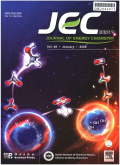- 钛学术文献服务平台 \
- 学术期刊 \
- 工业技术期刊 \
- 石油与天然气工业期刊 \
- 能源化学期刊 \
Advanced metal-organic frameworks for aqueous sodium-ion rechargeable batteries
Advanced metal-organic frameworks for aqueous sodium-ion rechargeable batteries
基本信息来源于合作网站,原文需代理用户跳转至来源网站获取
摘要:
Inexpensive and abundant sodium resources make energy storage systems using sodium chemistry promising replacements for typical lithium-ion rechargeable batteries (LIBs).Fortuitously,aqueous sodium-ion rechargeable batteries (ASIBs),which operate in aqueous electrolytes,are cheaper,safer,and more ionically conductive than batteries that operate in conventional organic electrolytes;furthermore,they are suitable for grid-scale energy storage applications.As electrode materials for storing Na+ ions in ASIBs,a variety of multifunctional metal-organic frameworks (MOFs) have demonstrated great potential in terms of having porous 3D crystal structures,compatibility with aqueous solutions,long cycle lives (≥1000 cycles),and ease of synthesis.The present review describes MOF-derived technologies for the successful application of MOFs to ASIBs and suggests future challenges in this area of research based on the current understanding.

推荐文章
Effects of organic mineral fertiliser on heavy metal migration and potential carbon sink in soils in
Karst
Soil pollution
Cd
Organic mineral fertilisers
Carbon sink
Adsorption characteristics of copper ion on nanoporous silica
Nanoporous silica
Copper ion
Adsorption
Zinc isotope fractionation under vaporization processes and in aqueous solutions
Evaporation process
Zinc isotope
Kinetic isotope fractionation
Equilibrium fractionation
Zinc species in solution
An experimental study on metal precipitation driven by fluid mixing: implications for genesis of car
Metal precipitation
Fluid mixing
Sulfur species
MVT lead–zinc ore deposits
Carbonate-hosted
lead–zinc deposits
内容分析
关键词云
关键词热度
相关文献总数
(/次)
(/年)
引文网络
引文网络
二级参考文献 (0)
共引文献 (0)
参考文献 (1)
节点文献
引证文献 (0)
同被引文献 (0)
二级引证文献 (0)
2001(1)
- 参考文献(1)
- 二级参考文献(0)
2021(0)
- 参考文献(0)
- 二级参考文献(0)
- 引证文献(0)
- 二级引证文献(0)
引文网络交叉学科
相关学者/机构
期刊影响力
能源化学
主办单位:
中国科学院大连化学物理研究所
中国科学院成都有机化学研究所
出版周期:
双月刊
ISSN:
2095-4956
CN:
10-1287/O6
开本:
出版地:
大连市中山路457号
邮发代号:
创刊时间:
语种:
eng
出版文献量(篇)
2804
总下载数(次)
0
总被引数(次)
7996
期刊文献
相关文献
推荐文献
- 期刊分类
- 期刊(年)
- 期刊(期)
- 期刊推荐
一般工业技术
交通运输
军事科技
冶金工业
动力工程
化学工业
原子能技术
大学学报
建筑科学
无线电电子学与电信技术
机械与仪表工业
水利工程
环境科学与安全科学
电工技术
石油与天然气工业
矿业工程
自动化技术与计算机技术
航空航天
轻工业与手工业
金属学与金属工艺
能源化学2022
能源化学2021
能源化学2020
能源化学2019
能源化学2018
能源化学2017
能源化学2016
能源化学2015
能源化学2014
能源化学2013
能源化学2012
能源化学2011
能源化学2010
能源化学2009
能源化学2008
能源化学2007
能源化学2006
能源化学2005
能源化学2004
能源化学2003
能源化学2002
能源化学2001
能源化学2021年第9期
能源化学2021年第8期
能源化学2021年第7期
能源化学2021年第6期
能源化学2021年第5期
能源化学2021年第4期
能源化学2021年第3期
能源化学2021年第2期
能源化学2021年第12期
能源化学2021年第1期

 免费查重
免费查重










